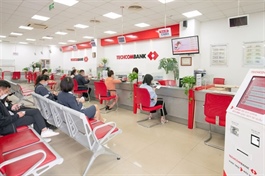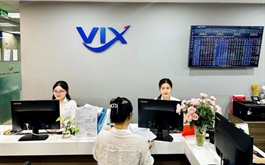Driving forces set scene for capital market momentum
Driving forces set scene for capital market momentum
Vietnam is entering a pivotal phase of economic transformation, with bold policy reforms and a renewed focus on domestic capacity building setting the stage for a capital market upgrade and long-term growth.
The stock market in Vietnam had risen close to 1,500 points by the end of June, but the pace of change has left many investors struggling to keep up. At the Investor Day 2025 seminar hosted by Dragon Capital on July 12, experts noted that while the market is showing momentum, some financiers have yet to see the full picture.
|
Marking 25 years of capital market development Vietnam Investment Review will host a high-level roundtable called “Driving Forces Behind New Capital Inflows” to commemorate 25 years of Vietnam’s stock market. Taking place on July 23 at VIR’s headquarters (47 Quan Thanh Street, Ba Dinh Ward, Hanoi), the roundtable will bring together key stakeholders including policymakers, business leaders, investment professionals, and media representatives. The event will explore macroeconomic trends, shifts in domestic and foreign capital flows, and actionable strategies to unlock new financial momentum. As Vietnam enters a new chapter of national development, shaped by deepening reforms and global integration, the capital market is set to play a pivotal role in sustaining growth and enabling transformation. |
Le Anh Tuan, chief investment officer at Dragon Capital, observed that since 2007, Vietnam’s development path leaned heavily on foreign capital and the presence of multinational corporations. This approach, centred around external investment, enabled labour to move into higher-productivity sectors, while boosting capital accumulation and enhancing workforce quality.
However, from this year, Tuan pointed to a strategic pivot in which growth will increasingly be driven by internal forces. He underscored the importance of developing domestic industrial clusters and fostering core national competitive advantages as key pillars of this new direction.
“Vietnam must now prioritise improving the competitiveness of domestic enterprises,” said Tuan. “This is not just a policy shift, it is fundamental to the country’s long-term development prospects.”
This change in approach reflects a broader commitment. As Dragon Capital noted, the Politburo has set a target of integrating at least 20 Vietnamese enterprises into global value chains. For the first time, the private sector is being tasked with executing national objectives, in alignment with government direction. This unprecedented level of public-private coordination represents a notable departure from previous policy cycles.
The country is stepping into a new investment cycle, supported by both steady economic growth and a clearer push from the political system. With the government becoming more streamlined, better coordinated, and more decisive, reforms are moving faster. This stronger alignment across different levels of leadership is helping to create a more stable and attractive environment for long-term investment, Tuan explained.
While the speed of these reforms has raised some concerns, many experts believe such steps are necessary to improve efficiency and support the country’s long-term goals.
Complementing this administrative overhaul is an acceleration in legislative activity. Over the past year, the volume of laws and decrees issued has surpassed the combined total from the preceding three years. New legal tools, including specialised mechanisms, are enabling the government to address long-standing bottlenecks without having to wait for sweeping statutory amendments.
A significant step is a resolution granting the government the authority to resolve regulatory and legal impasses in delayed projects. If effectively implemented, this could unlock nearly 2,900 stalled projects with a combined value of $235 billion. “The scale of capital that could be released into the economy is enormous,” remarked Dang Nguyet Minh, head of research at Dragon Capital.
As Vietnam accelerates structural reforms, its capital market is moving closer to a long-anticipated upgrade from frontier to emerging market status. While this goal has been on the agenda for over a decade, occasionally leading to investor fatigue, recent developments suggest that the process is now gaining real traction.
A multi-agency initiative is being implemented, led by the Ministry of Finance, the State Bank of Vietnam, the Vietnam Securities Depository and Clearing Corporation, and the State Securities Commission. The coordinated roadmap prioritises regulatory improvements, infrastructure upgrades, and closer engagement with international credit rating agencies and global financial institutions. If successful, the upgrade could pave the way for a new wave of initial public offerings in the 2026-2027 period. Market projections indicate that total listings could reach $47.5 billion, with consumer-focused firms expected to contribute around $12.8 billion.
According to Vu Thi Chan Phuong, chairwoman of the SSC, Vietnam’s stock market has achieved tangible progress in both market capitalisation and product quality, and is increasingly playing a vital role in channelling medium- and long-term capital into the economy.
“Upgrading the market is among the most effective tools to attract these flows,” said Phuong. “Actual experience of foreign investors in Vietnam will play a decisive role in how global rating agencies evaluate the country. Once issues resolved, investor experience becomes the deciding factor, because they, in effect, cast the vote for our upgrade.”
- 10:00 22/07/2025
























